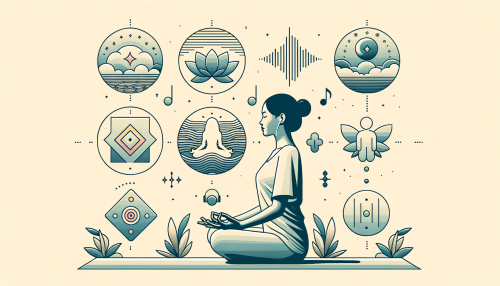Introduction
Immerse yourself in the tranquil realm of yoga, a practice that transcends the physical, delving into the mental and spiritual. “Yoga for the Mind: How Asanas Enhance Mental Clarity” explores the profound impact of yoga postures, or asanas, on cognitive function. This article unravels the intricate tapestry of yoga’s influence on mental clarity, shedding light on how the ancient discipline fosters a serene mind, sharpens focus, and cultivates a heightened sense of awareness. As we navigate through the labyrinth of life, yoga serves as a beacon, illuminating the path to mental tranquility and clarity. Embark on this enlightening journey with us, as we delve into the transformative power of asanas on the mind.
Asanas for Concentration

The practice of asanas, or yoga postures, can be a potent tool for sharpening mental focus and enhancing cognitive clarity. Certain asanas, when performed with mindful intention, can stimulate the brain, increase blood flow to the cerebral cortex, and foster a state of mental tranquility conducive to concentration.
One such asana is the Bakasana, or Crow Pose. This balancing posture demands a high degree of mental focus as the practitioner must maintain equilibrium while supporting their body weight on their hands. The act of balancing in this pose can help to quiet the mind, drawing attention away from external distractions and fostering a state of inner calm. This heightened state of focus can then be carried over into daily life, aiding in tasks that require sustained concentration.
Another asana that can enhance mental clarity is the Paschimottanasana, or Seated Forward Bend. This pose involves a deep forward bend that can help to calm the mind and relieve stress. The act of folding forward can also stimulate the abdominal organs and increase blood flow to the brain, both of which can contribute to improved mental function.
Finally, the Savasana, or Corpse Pose, though seemingly simple, is a powerful tool for cultivating mental clarity. In this pose, the practitioner lies flat on their back, allowing their body and mind to relax completely. This state of deep relaxation can help to clear the mind of clutter and distractions, paving the way for improved concentration and mental clarity.
In conclusion, the practice of asanas can be a powerful tool for enhancing mental clarity and concentration. By incorporating these poses into a regular yoga practice, one can cultivate a state of mental tranquility that can aid in tasks requiring sustained focus.
Yoga and Mental Health
The intricate dance of yoga, with its myriad of asanas, is not merely a physical endeavor. It is a profound journey into the labyrinth of the mind, a quest for mental clarity and tranquility. The practice of yoga, an ancient discipline rooted in the wisdom of the East, has been recognized for its potential to enhance mental health. It is a conduit for inner peace, a tool for self-discovery, and a pathway to mental resilience.
The asanas, or postures, in yoga are not just about flexibility and strength. They are a form of moving meditation, a way to connect the body and mind. Each asana is a physical manifestation of a mental state, a tangible expression of an intangible thought or emotion. When we practice yoga, we are not just moving our bodies; we are exploring our minds. We are learning to observe our thoughts without judgment, to accept our emotions without resistance. This mindful awareness, this cultivation of equanimity, is a powerful antidote to stress, anxiety, and depression.
Yoga is not a panacea, but it is a potent ally in the battle for mental health. It teaches us to breathe, to be present, to be patient. It shows us how to navigate the tumultuous seas of our minds, how to weather the storms of our emotions. It helps us to cultivate a sense of inner calm, a state of mental clarity amidst the chaos of our daily lives. It is a practice of self-care, a commitment to our mental well-being.
In the end, yoga is not just about the asanas. It is about the journey, the process, the transformation. It is about finding balance, finding peace, finding ourselves. It is about learning to navigate the labyrinth of our minds, to find our way through the darkness and into the light. It is about learning to see clearly, to think clearly, to live clearly. It is about mental health, mental clarity, mental freedom. It is yoga for the mind.
Enhancing Cognitive Function
The practice of yoga asanas, or postures, has been shown to have a profound impact on cognitive function. The intricate movements and deep, rhythmic breathing associated with these postures can stimulate the brain, enhancing mental clarity and focus. This is not merely a subjective experience reported by yoga practitioners, but a phenomenon that has been substantiated by scientific research.
Studies have shown that the regular practice of yoga can lead to improvements in memory, attention, and even IQ scores. This is believed to be due to the increased blood flow to the brain that occurs during yoga, which can enhance the function of neurons and lead to improved cognitive abilities. Furthermore, the deep concentration required to hold yoga postures can also help to train the brain, improving mental focus and clarity.
In addition to these physical benefits, yoga also promotes a sense of calm and mindfulness that can further enhance cognitive function. The practice of yoga encourages a focus on the present moment, which can help to clear the mind of distractions and improve concentration. This mindfulness aspect of yoga can be particularly beneficial in today’s fast-paced, multitasking society, where our attention is often divided among multiple tasks.
In conclusion, the practice of yoga asanas can provide a wide range of benefits for cognitive function. From improving memory and attention to promoting mindfulness and mental clarity, these postures can serve as a powerful tool for enhancing mental health. Whether you are a seasoned yogi or a beginner, incorporating yoga into your routine can help to boost your brain power and improve your mental clarity.
Conclusion
In essence, the practice of yoga asanas, far from being merely physical, serves as a conduit for mental clarity and cognitive enhancement. The intricate dance of breath and movement, the symphony of stillness and exertion, all coalesce to form a potent antidote to mental fog and cognitive lethargy. The mind, once ensnared in the labyrinth of stress and anxiety, finds solace and liberation in the rhythmic cadence of yoga. The mental cobwebs are swept away, replaced by a luminous clarity that illuminates the path to self-awareness and inner peace. Thus, yoga asanas, in their profound simplicity, offer a sanctuary for the mind, a haven where mental clarity is not just sought, but found and nurtured.





